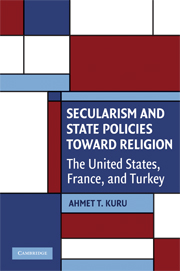Book contents
- Frontmatter
- Contents
- List of Figures and Tables
- Glossary of Abbreviations
- Acknowledgments
- Secularism and State Policies toward Religion
- Introduction
- 1 Analyzing Secularism
- PART I THE UNITED STATES
- 2 Passive Secularism and the Christian Right's Challenge (1981–2008)
- 3 Religious Diversity and the Evolution of Passive Secularism (1776–1981)
- PART II FRANCE
- PART III TURKEY
- Conclusion
- Appendix A State-Religion Regimes Index of 197 Countries
- Appendix B Human Development and Official Religion in 176 Countries
- Appendix C State-Religion Regimes in Forty-Six Muslim Countries
- Appendix D Turkey's National Security Council Decisions, February 28, 1997
- Bibliography
- Index
3 - Religious Diversity and the Evolution of Passive Secularism (1776–1981)
Published online by Cambridge University Press: 05 June 2012
- Frontmatter
- Contents
- List of Figures and Tables
- Glossary of Abbreviations
- Acknowledgments
- Secularism and State Policies toward Religion
- Introduction
- 1 Analyzing Secularism
- PART I THE UNITED STATES
- 2 Passive Secularism and the Christian Right's Challenge (1981–2008)
- 3 Religious Diversity and the Evolution of Passive Secularism (1776–1981)
- PART II FRANCE
- PART III TURKEY
- Conclusion
- Appendix A State-Religion Regimes Index of 197 Countries
- Appendix B Human Development and Official Religion in 176 Countries
- Appendix C State-Religion Regimes in Forty-Six Muslim Countries
- Appendix D Turkey's National Security Council Decisions, February 28, 1997
- Bibliography
- Index
Summary
An inquiry about the current dominance of passive secularism in the United States requires an historical analysis. The lack of an ancien régime based on monarchy and hegemonic religion shaped the formation of passive secularism during the American founding period. America was a new country that had religious diversity. These initial conditions nurtured the emergence and dominance of passive secularism. In contrast, in France and Turkey, when the secular republic was founded, it had a perceived threat from the ancien régime based on old monarchy and the hegemony of Catholicism or Islam.
The alliance between the British monarchy and the Anglican Church in colonial America did not mean an ancien régime for three main reasons. First, the Anglican Church was established only in Virginia, South Carolina, North Carolina, Georgia, Maryland, and some counties of New York. Congregational churches were established in New England (including Massachusetts, Connecticut, and New Hampshire), and there was no establishment in Rhode Island, Pennsylvania, Delaware, and, arguably, New Jersey. Second, even in the limited number of colonies “the Anglican establishment was during most times nominal and the church's control over religious concernments largely ineffective.” Last but not least, in the aftermath of the American Revolution, the British monarchy was largely regarded as a foreign power, instead of a local monarchy to be reestablished. Related to that, the Anglican Church in the United States did not have the popular support the Catholic Church and Islamic institutions had in France and Turkey.
- Type
- Chapter
- Information
- Secularism and State Policies toward ReligionThe United States, France, and Turkey, pp. 74 - 100Publisher: Cambridge University PressPrint publication year: 2009



